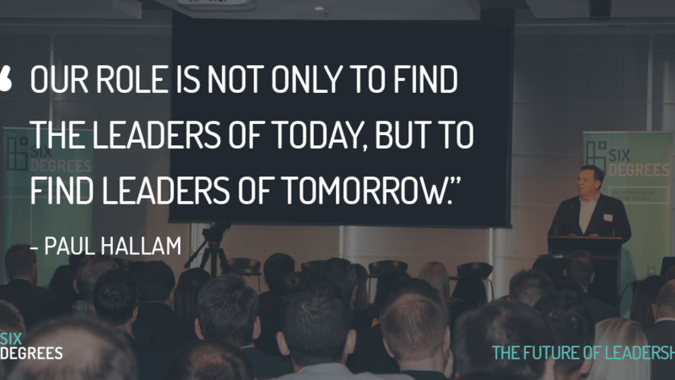
A leadership crisis: no confidence now, no optimism for the future.
By: Alastair Pennie

Six Degrees hosted an event to launch our research on ‘The Future of Leadership’ with 100 clients in attendance. We invited a preeminent panel of leaders, moderated by Joanne Gray, editor Boss Magazine for the AFR, to discuss the findings.
A lack of confidence in business leaders
Our research found that expectations of our leaders have radically changed, and Australian business leaders aren’t keeping up. The report delves into the current state of leadership in Australia, finding significant gaps between how business leaders are currently operating and the values their employees are increasingly seeking. Terry Svenson, CEO of Cerebos, commented that the research “is a real call to action”.
“We have operated in one way of thinking for a long time and we've had conditions around us, that have allowed us to be fairly successful. Now we face a future that is much more challenging. What's now being called into question is how do we need to organise our businesses? What skills are going to allow us to succeed in the future?” Paul Bull, Managing Director, Real World Marketing.
Attributes that may have historically defined successful leaders, such as work ethic and a track record of success in the company are no longer regarded as indicators of a successful business leader, rather the minimum expectation.
“This is confronting for corporate Australia as it challenges traditional structures and processes of the past, that will not serve us in the future,” said Paul Hallam, Managing Director, Six Degrees. Most still recruit using a one, or at best, a two-dimensional assessment checklist; track record and work ethic. In other words, ‘have you done it before?’ and ‘did you do a good job?’ (work hard).
As part of the research, we interviewed over 35 CEOs, many whom noted that technical proficiency does not necessarily translate to good leadership skills. Svenson said “I think one of the key things that's been highlighted in the research is that some of the leadership traits of the past, where you've needed technical skills to be able to be promoted to senior leadership roles probably don't cut it anymore…I think what people are now looking for is an ability to be able to be authentic, communicate, and most importantly listen...In fact, as you go through your career, it’s about ensuring that you have the right questions as opposed to the right answers”.
“The leader isn’t the smartest person in the room, but hires the smartest people in the room and then provides vision and inspiration”. Paul Hallam, Managing Director, Six Degrees.
At the opposite end of the spectrum - what do we want from business leaders? Team building and interpersonal communication skills were the most important but saw current business leaders ranked poorly by respondents with over a third rating their leader’s ability to communicate effectively as poor.
No optimism for our future leaders
Beyond the dissatisfaction with current business leaders, 92% of respondents do not feel that there is a strong pipeline of leaders in the Australian workplace, and four in ten believed their organisation is poorly placed to develop leaders, indicating leadership expectations will continue to stay low without significant change.
Not only do we have little confidence in our current leaders, we don’t think our future leaders are up to the task either.
A key issue with current leaders is who gets chosen to lead - and how this process is managed. There is high dissatisfaction with traditional performance review practices still in place in many organisations with a preference for 360 feedback and senior mentors.
READ THE FUTURE OF LEADERSHIP RESEARCH REPORT
Fiona Lang, COO, BBC Worldwide discussed the benefit of two-way mentoring saying that “the younger generation are skilled in completely different ways, I think they will have something like 11 careers during their lifetime. So, if you’re able to tap into that, it helps to solve the problem. I’m going to exhaust myself in skilling-up in everything that they already have. I must trust them and in return, I work on their development”.
“[To develop leaders] it requires us to, on occasion, challenge our people. To say, ‘Hey, do you want to do something that makes you incredibly uncomfortable?’, and I'm going to make you accountable to it. It's sort of like coaching, but it's also holding their hand and walking into the ambiguity with them for a bit. Staying in ambiguity is a good thing”. Preeti Bajaj, VP Strategy & Transformation, Schneider Electric.
When recruiting for leaders, Bajaj looks for leaders “who can show diversity of experience in industry, because that's a signal of learning ability…In the US, and to a lesser extent Europe, it's far more common for organisations to hire from outside their own industries, based on transferable skills”.
Hallam concluded the event by saying “Leadership is fundamentally changing and it has never been more evident. Our people are telling us we don't understand them, or we’re not listening, especially Millennials. I think it’s important for everyone here to ask themselves, “how do I measure up in this day of authentic leadership?”, because that is what our people are expecting of us.
Alastair Pennie
Associate Director, NSW
Related


Stay ahead of the EOY crunch with contracting
Even though December comes around the same time every year, somehow it still manages to hit us with...
.jpg?width=352&name=FMCG%20Sales%20-%20Blog%20(3).jpg)
FMCG Sales: 2025 Trends & Hiring Challenges
In a market defined by consolidation, and caution, FMCG Sales leaders are facing increased pressure...

 Accessibility
Accessibility